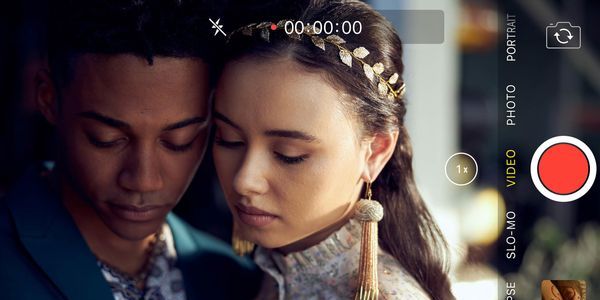There’s never any shortage of new talent to be discovered at Sundance, and that is certainly the case again for this year’s edition of the festival. In addition to showcasing features from 38 first time directors, the 2021 edition of the Sundance Film Festival continues to rally behind bold and innovative creative choices that push the cinematic art form into new directions. The following two films – R#J and First Date – screen as part of the festival’s NEXT program, and both films feature young talents looking to be discovered.
R#J (Carey Williams)

Films presented through the lens of social media are not necessarily novel anymore, but they’re certainly not considered common in mainstream entertainment. Countless filmmakers have experimented with the idea of creating a coherent narrative through the screens of your laptop or smartphone, and in all honesty, the outcome is rarely something to write home about. The one exception from recent memory would be Aneesh Chaganty’s Searching (which also premiered at Sundance in 2018), a film that takes place almost exclusively through a character’s computer screen, but still manages to weave an emotional story in a cinematic way. Carey Williams’ R#J aims to replicate the storytelling marvel of Searching, and stands as a technically sound piece of filmmaking.
Set in present times, R#J is a modern retelling of Shakespeare’s Romeo and Juliet, as told in 2021. The story is one that is well known to most, with Romeo (Camaron Engels) and Juliet (Francesca Noel) falling in love with each other, only to discover that they come from rivalling families (the Montagues and Capulets). Shifting the story to Verona, and having the story revolve around people of colour, this is an adaptation of a classic in the most modern of ways possible.
The biggest question here is whether the film’s creative ambitions help to elevate its narrative, rather than simply serving as a gimmick that adds to its popular culture relevance. In a surprising way, Williams’ world-building through iMessage and Instagram chat windows felt assured and natural. It was easy to dive into the story of both Romeo and Juliet, and having social media play a big part in their courtship also helped to set the stage for a film that needed its technological format. Williams finds a way to convince audiences that this was the only manner in which this love story could’ve been told, rather than a forced choice for the purposes of novelty.
What’s perhaps missing in R#J is the lavish sense of romance that one might naturally expect from an adaptation of one of the most prolific love stories ever written. Engels and Noel certainly make an effort to develop onscreen chemistry, but it was admittedly hard to fully invest in their romantic gestures through a purely virtual lens. Perhaps the younger generation may find that to be untrue, and in all fairness, this is an adaptation that will likely appeal more to Generation Z filmgoers. The film is in no way a signposting of how the cinematic medium might evolve in the future, but it certainly proves that it’s possible to create cinema through a social media lens.
First Date (Manuel Crosby and Darren Knapp)
Marketed as a ‘Superbad meets True Romance’ coming-of-age thriller, Manuel Crosby and Darren Knapp’s First Date certainly has the feels of a raunchy cinematic thrill ride. There’s a slew of energy that kicks off the narrative, but the film as a whole isn’t able to fully lean behind this initial bounce of momentum. A valiant first effort with lots of fun moments, but not enough substance to serve as a fulfilling cinematic experience.
The film follows Mike (Tyson Brown), a shy high school student who musters enough confidence to ask his classmate Kelsey (Shelby Duclos) out on a date. When his parents end up leaving town for the night and takes the family car with them, Mike ends up buying a used 1965 Chrysler through an online advertisement. What follows is a series of misadventures involving the criminal underworld and a first date for Mike and Kelsey that is unforgettable for all the wrong reasons.
The comedic elements of First Date are pretty much on point from beginning to end, with flashes of humour that feels both familiar and refreshing. It’s never quite as raunchy as Superbad or the Jump Street films, but uses the same brand of teenage misfortune as a source of laughs. The slew of deranged side characters is also on-brand with the film’s shady worldview and helps create a fun environment for the underlying narrative. Brown and Duclos are also great together, and both show promise as young performers.
What ultimately makes First Date a relatively unfulfilling experience is its lack of kinetic energy. For a film that seems to ride on the edge of morality and bathes itself in dark humour, there just isn’t that drive from Crosby and Knapp to really push their narrative agenda into full gear. As a result, the film often feels out of place and void of a strong stylistic identity, despite having many positive elements. First Date simply isn’t as fun as it should’ve been, which is unfortunate, because the film does have all the elements of a ludicrous viewing experience. If it were packaged together with more confidence and gravitas, the final product might have been more impactful. But Crosby and Knapp demonstrate that they do have keen creative instincts, and will hopefully be able to fully capitalize on their talents the next time around.
Does content like this matter to you?
Become a Member and support film journalism. Unlock access to all of Film Inquiry`s great articles. Join a community of like-minded readers who are passionate about cinema - get access to our private members Network, give back to independent filmmakers, and more.